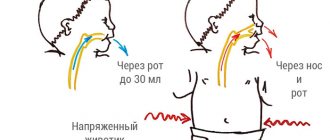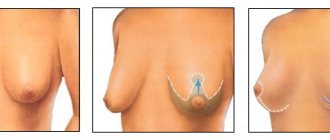Why does the baby spit up? Almost every mother asked this question. And this is understandable; concern for the baby comes first for her.
Most often this is a physiological problem that does not require special intervention.
But there are rare cases that you need to pay special attention to and show the child to a specialist. It is worth studying the causes of regurgitation and ways to prevent them.
What to do when a child spits up like a fountain?
If the baby burps like a fountain for the first time, do not immediately panic and immediately call an ambulance. It is necessary to calmly perform some actions according to the advice of pediatricians:
as soon as this happens, the child should immediately be placed on his side so that the vomit does not enter the respiratory tract;
if the baby burps on himself, he needs to be washed and his clothes changed;
The baby should be given some warm water to drink;
you need to pick up the child vertically and walk around the room with him, lightly stroking his back and calming him down;
As soon as the baby calms down, you should check to see if his temperature has risen or if he has become lethargic (if any extraneous symptoms are detected, you should immediately call a doctor).
Why does a baby spit up - the most common reasons
Babies can regularly burp for a variety of reasons, most of which are not a reason to panic. However, you should understand each of them in detail:
The child simply overeats - infants may not feel their normal limits and eat more than their small body needs. The stomach of such a child does not yet know how to stretch, so excess food is not retained in it. The problem of frequent regurgitation is most often faced by mothers who are accustomed to feeding their babies on demand. It is important to understand that children are often capricious and demand the breast only to be closer to their mother, and not because they are hungry. Even an extra 40 g of milk will not be retained in his tiny stomach, and he will definitely regurgitate it.
During breastfeeding, the baby does not grasp the nipple correctly - because of this, during the feeding process, he swallows not only mother’s milk, but also air, which then “breaks out” with a small amount of food.
The child has increased gas production - because of this, food slowly moves towards the intestines and is simply thrown back through the esophagus. To prevent this from happening, it is necessary to eliminate the problem of colic and flatulence.
The child has congenital pathologies of the central nervous system and gastrointestinal tract - this reason cannot be excluded. To confirm it and begin treatment, the baby must undergo a full medical examination.
The baby has intestinal obstruction - this disease is very serious and requires immediate treatment. The pathology occurs due to the accumulation of feces in the child’s intestines, or the accumulation of original mucus in his stomach. Intestinal obstruction can also be caused by a tumor in the large or small intestine. You can notice the symptoms of this disease yourself: approximately 2-3 hours after feeding, the baby begins to vomit, which contains impurities of bile and mucus. The vomit smells very unpleasant.
Too active behavior of the baby immediately after feeding - perhaps the mother immediately began to play with him, or decides to immediately change his clothes. It is necessary to analyze your own actions after the child has eaten - often the reason for frequent regurgitation lies precisely in them. It is not recommended to expose your baby to active movements, and for at least 20 minutes immediately after eating, he should be calm, preferably in an upright position. If the baby does not hold his head well, you can build a special support for him from a blanket or towel, folded several times (it is placed on the mother’s hand, and the baby himself is placed on top).
If the baby burps in small portions after each feeding, and is very active, gains weight well, does not act up or cry, then regurgitation should not be a cause for concern.
Why does a baby spit up like a fountain?
Newborns and infants need attention and care. They require certain care, because the developing child’s body is not yet strong and cannot independently and fully carry out all the necessary life processes. One of the signs of the developing digestive system in infants is regurgitation. It usually occurs after feeding and does not depend on the product consumed - be it breast milk or formula. Regurgitation is considered normal if it occurs in babies under 6 months of age. If its frequency does not decrease after this age, the child needs to consult a doctor.
Causes of regurgitation
Belching of stomach contents after feeding in infants can be of different types. It can be either weak in intensity or come out under pressure (fountain) and resemble vomiting. This process is due to a number of factors that we will now try to figure out.
Regurgitation can be physiological (normal) or indicate a disease. Natural regurgitation occurs for the following reasons:
If the baby swallowed a lot of air during feeding. This is possible during breastfeeding, when the mother does not attach the baby to the breast correctly, or when there is not enough milk in the mammary gland. In such cases, the baby often opens his mouth wide, performing sucking movements, which captures air. When bottle feeding, the cause of regurgitation is a large hole in the nipple. The more air the child swallows, the more powerful the vomit will be after feeding.
When the baby has eaten a lot of formula or breast milk. A child's stomach has a certain size, and if the baby eats too much with appetite, it will definitely come out.
Also natural and not indicative of disease
Source
What is regurgitation?
Neonate regurgitation, sometimes called physiological or uncomplicated reflux, is common in babies and is usually (but not always) normal.
Most young babies spit up occasionally because their digestive systems are immature, allowing stomach contents to return to the esophagus.
Many newborns and infants spit up some of their mother's milk or formula during or shortly after feeding. Some babies spit up only occasionally, while others spit up after every feeding.
The baby often spits up after feeding when he receives a lot of milk in a short period of time. This happens when the baby suckles very quickly and forcefully or when the mother's breasts are too full.
When a baby is often distracted (pulling the breast to look around) or fussing at the breast, he swallows air and therefore will burp more often. Some babies spit up more when they start teething, crawling, or eating solid foods.
The main causes of regurgitation in children
It is necessary to find out why the baby spits up after feeding. Here are some reasons for this:
- a common cause of regurgitation is excessive overfeeding of the baby;
- swallowing air with milk, this occurs when the mother’s nipple is not captured correctly;
- bowel disorders such as colic and constipation;
- rapid breastfeeding leads to hiccups and regurgitation;
- tight swaddling or active movement of the baby immediately after feeding;
- poor development of the muscles of the esophageal valve (sphincter), it begins to work fully only closer to one year;
- ecology, cases of an allergic reaction in a child to a certain product are becoming more and more common;
- Well, severe cases when you need to see a doctor are diseases of the digestive system, disorders in the central nervous system or pathology in the child’s body.
It is normal to regurgitate about two teaspoons of milk.
You can check this in the following way: pour a teaspoon of water onto the diaper and compare both stains. If they are approximately the same, then there is no need to worry. Month after month, as the baby grows, the amount of regurgitation will decrease. Tips to prevent spitting up in your baby
Despite the fact that regurgitation that is functional in nature is not dangerous and does not require treatment, it would be useful to eliminate the causes and follow a few rules. If every mother knows them, then the question of why the child often spits up will not come to her mind.
Basic Rules:
- do not overfeed the baby, give breastfeeding on demand and be sure to ensure proper nipple latching;
- after feeding, hold the baby upright to burp air;
- before feeding, place it on your tummy;
- during feeding, the child should be in a “reclining” position;
- When feeding from a bottle, the hole in the nipple should not be large, otherwise the baby will quickly suck the formula, swallowing air. This will be the reason why the baby spits up after bottle feeding.
- It is advisable to raise the head of the crib by 10 cm;
- If the baby is bottle-fed, it is possible that formula is not suitable for him.
Several statistics
- The child vomits curdled milk immediately after eating. But it happens that the baby spits up an hour after feeding;
- half of all children under 3 months burp at least once a day;
- regurgitation usually peaks at 2 to 4 months;
- many children outgrow this condition by 7–8 months;
- Most babies stop spitting up by 12 months.
When a baby spits up milk, this is not a cause for concern. The fact that the baby regurgitates a curdled mass is explained by the action of an enzyme contained in the stomach juice. The enzyme is responsible for preparing food for the next stages of digestion.
Why does a child burp often?
Drinking large amounts of foremilk
This is a common reason why a baby spits up. During breastfeeding, breast milk changes in consistency and composition.
At first, the milk is more watery and rich in lactose. Later, the milk becomes richer and more nutritious. Accordingly, as the baby eats, the amount of fat in human milk increases.
It is possible that the baby is constantly spitting up because he is receiving more foremilk.
This can happen if a nursing mother takes too long a break between feedings and the amount of foremilk in the mammary glands increases.
In what cases is a doctor needed?
If the above tips do not help, the child continues to spit up profusely, while screaming, squirming, losing weight, apathetic and pale, then you should immediately consult a pediatrician.
Perhaps he will prescribe an examination with a neurologist. The pediatrician himself can recommend nutritional correction.
Pharmacies today have enough products that can help a child and reduce the number of regurgitations. These include anti-reflux medicinal mixtures and medications “Cerukal”, “Motilium”, etc.
And do not prescribe treatment yourself, only as prescribed by your doctor.
We hope that after studying this article, many mothers will understand why an infant spits up. And only her attentiveness and adherence to the simplest rules will help the mother get rid of nervous disorders, and the baby from frequent and profuse regurgitation.
Why does a child spit up like a fountain?
If your baby spits up frequently and a lot, he may have the following conditions that require medical attention.
If your baby spits up like a fountain, he may have a condition called gastroesophageal reflux disease (GERD).
Symptoms:
- frequent regurgitation or vomiting;
- discomfort when regurgitating.
It happens that the child does not burp in the full sense of the word, but quiet reflux occurs. This is a phenomenon in which the contents of the stomach only reach the esophagus and are then swallowed again, causing pain.
Signs of severe reflux:
- the child cries a lot during feeding, it is impossible to calm him down;
- poor weight gain or loss;
- refusal to eat;
- difficulty swallowing, hoarseness, chronic nasal congestion, chronic ear infections;
- regurgitation that is yellow or mixed with blood.
Pyloric stenosis
A condition in which the muscles at the bottom of the stomach harden and prevent food from passing into the small intestine. Fountain regurgitation in newborns in combination with underweight are clear signs of pyloric stenosis.
And it affects more boys than girls. This usually occurs in infants at about 1 month. Pyloric stenosis requires surgical correction.
Intestinal obstruction
If there is green bile in your baby's regurgitation, this is one sign of a blockage in the intestines, which will require an emergency room visit, a scan, and possibly emergency surgery.
Disorders of the central nervous system
Disturbances in the functioning of the central nervous system are also the answer to the question of why a newborn spits up like a fountain.
Infection
After the first months of life, the most common cause of regurgitation is a stomach or intestinal infection. Viruses are the most common infectious agents, but sometimes bacteria and even parasites can be the cause. The infection can cause fever, diarrhea, and sometimes nausea and abdominal pain.
Rotaviruses are the leading cause of regurgitation in infants and young children, with symptoms often progressing to diarrhea and fever.
Rotavirus is one of the viral causes of gastroenteritis, but other types of viruses such as noroviruses, enteroviruses, and adenoviruses can also cause this condition.
Sometimes infections outside the gastrointestinal tract cause regurgitation. These are infections of the respiratory system, ear infections, and urinary system.
Some of these conditions require immediate medical treatment. So be vigilant no matter your child's age and call your pediatrician if:
- blood or bile in vomit and regurgitation;
- severe abdominal pain;
- persistent, repeated fountain regurgitation;
- a swollen or visually enlarged abdomen;
- lethargy or severe irritability of the baby;
- convulsions;
- signs or symptoms of dehydration - dry mouth, lack of tears, recessed fontanel and decreased amount of urination;
- prolonged vomiting for more than 24 hours in a row.
What to do if a child spits up?
- If your baby spits up frequently, change your feeding position to a more upright position. Gravity will play a role in retaining milk in the stomach if the baby is held upright for about half an hour after feeding.
- Avoid any vigorous activity immediately after eating. This may cause the baby to burp.
- Provide a calm and relaxed atmosphere during feeding. Don't leave your baby very hungry before you start feeding him. A hungry and anxious baby may swallow a lot of air, increasing the chances of breast milk reflux.
- Feed your baby in small portions, but more often, to avoid an overfilled tummy.
- Avoid overfeeding your baby.
- Have your baby burp as often as possible to get rid of any air that might be absorbed from the food. If you don't see a burp after a few minutes, don't worry. Your baby may not need this.
- The child should be placed to sleep on his side or back, and not on his stomach. If your baby spits up during sleep, keep his head elevated.
- Don't put pressure on your stomach. Loosen any tight clothing, and do not place your baby's stomach on your shoulder so he can burp.
- Eliminate certain foods from your diet to see if the problem of frequent spitting up resolves.
When is a doctor needed?
Frequent regurgitation in newborns is a process that almost any mother can cope with. But in some cases treatment is necessary.
If the child constantly burps or the amount, smell or color of the regurgitation has changed, contact a specialist. First of all, visit your pediatrician. Then he can refer you to a gastroenterologist, neurologist, or surgeon.
Do not delay a visit to the doctor if the child spits up heavily and then screams or squirms. This behavior may mean that the baby's esophageal walls are irritated.
Increased attention is required if the regurgitation looks like a fountain, occurs after each feeding, or looks like vomiting and after it the body temperature rises.
Don’t take unnecessary risks, show your child to a specialist.
Sometimes regurgitation is so frequent that the child does not gain as much body weight as necessary. This is much more important and may require special tests and more aggressive treatment. If testing confirms gastroesophageal reflux, treatment may include gentle feeding techniques and possibly medications.
Some medications, such as ranitidine, help neutralize stomach acids and protect the sensitive lining of the esophagus, which is exposed to stomach acid due to regurgitation. Others, such as Omeprazole or Lansoprazole, stimulate the stomach to move food into the intestines more quickly.
Baby spitting up is one of the most important and sometimes confusing issues you will face as a parent. The recommendations in this article are general in nature and apply to infants in general. Remember that your child is unique and may have special needs. If you have questions, ask your pediatrician to help you find answers that apply specifically to your baby.
Most families with a newborn baby are faced with the problem of regurgitation. This phenomenon frightens parents because it is very similar to vomiting. However, regurgitation is often not associated with pathological processes and is quite acceptable in infancy. Why does a newborn spit up? Is there anything I can do to help him? Let's discuss.
Is it normal for a baby to spit up?
Yes, there is nothing criminal about this, and, with the exception of special cases, regurgitation is considered a physiological process. More than 70% of infants experience this phenomenon before the age of six months.
Regurgitation is the release of small portions of undigested or semi-digested food (most often mother's milk) from the stomach. If the baby is not capricious, smiles and is gaining weight well, you don’t have to worry too much. But when the baby behaves restlessly, loses weight over time, and spits up constantly like a fountain, be sure to consult a doctor as soon as possible. We'll discuss why this happens a little later.
Either vomiting or regurgitation
Every mother needs to be able to distinguish between these two conditions, because our further actions will depend on what we are faced with.
Regurgitation
|
As you can see, vomiting is a phenomenon that brings with it spasms and pain; a child will never be cheerful in such a state, while he may not particularly react to regurgitation.
Vomiting or regurgitation?
First of all, young mothers need to learn to distinguish between regurgitation and vomiting:
Regurgitation: the mass flows out unhindered, the abdominal muscles do not contract. Occurs 1–2 times a day, after feeding. The consistency of the discharge is liquid, resembles cottage cheese and has no specific odors. The baby is in good physical condition.- Vomiting: copious discharge of vomit, which is accompanied by spasms of the abdominal muscles. Preceded by nausea, pale skin and copious amounts of saliva. Repeated attacks that are not dependent on food intake. The mass is yellow. The baby constantly cries and feels unwell.
As you can see, regurgitation does not cause pain or discomfort to the child. In most cases, he doesn’t even notice it and remains happy and cheerful.
Causes of regurgitation
The digestive system of a newborn baby is in the formative stage, and this is the main factor that the baby often spits up. Here are some reasons why this phenomenon occurs:
- Binge eating . As Winnie the Pooh's friend, Smart Rabbit, said: "It's all because someone eats too much." It's no secret that sucking a mother's breast gives the baby a feeling of security and love. This state is so comfortable that even after eating, the baby does not want to leave the breast. Because of this “attachment,” the child may drink too much. But the stomach knows its norms, and regurgitation becomes a defensive reaction. In babies who are bottle-fed, a similar picture may be observed due to the fact that the standard dose from a bottle is too much.
- Air and food. It is not uncommon for air bubbles to get in with the food during feeding. This occurs due to improper attachment to the breast, or the awkward position of the child while eating. If feeding from a bottle, the hole in the nipple may be too large, and the milk (formula) flows out under great pressure.
- Flatulence. A child receiving breast milk also consumes substances from the foods that the mother ate the day before. And if the foods included legumes, cabbage, fresh apples, brown bread, it is quite possible that there was increased gas formation, causing, in addition to cramps, an increase in intra-abdominal pressure. As a result, the baby may burp.
- Weak sphincter muscles. They will be formed during the first 6 months of life. In the meantime, the untrained muscle “passes” the contents that entered the stomach back.
- Overexcitement. This reason, although rarely leads to regurgitation, has a right to exist.
- Teething . This way the body gets rid of excess saliva.
The main reasons for regurgitation of curdled milk or formula
There are several most common reasons for this problem:
- improper attachment to the mother's breast, her nervousness;
- horizontal position of the baby (and bottle) during feeding;
- the hole in the nipple is too large;
- the bottle is not completely filled with breast milk or formula;
- too high room temperature;
- the child is restless, fidgets and swallows a large amount of air. This happens mainly due to cramps (colic) in his stomach and when he feels unwell (constipation, gas, etc.).
A child vomits curdled milk even when a number of diseases develop or there are certain developmental features inherent to his age:
- insufficiently tight closure of the valve separating the stomach from the esophagus. His muscles become stronger when the baby reaches one year old. Before this, an involuntary reflux of curdled milk from the stomach into the esophagus is possible. This, in turn, leads to regurgitation;
- infectious diseases;
- allergy to the mixture you selected;
- disturbances in the normal functioning of the gastrointestinal tract (most often congenital), such as an overly narrow junction between the esophagus and stomach;
- neurotic airbrushing, or pneumatosis of the stomach. This problem can occur when the mother does not have enough milk. The baby’s nervous system is still very weak and cannot fully cope with the regulation of the entire digestive apparatus. As a result, from time to time the child spits up a cheesy mass.
Pathological regurgitation
If a month-old baby burps frequently, profusely, and loses body weight, be sure to show the baby to the doctor. Such symptoms may indicate the development of a serious illness.
- Pathology of the digestive organs. For example, an anomaly such as pyloric stenosis appears already in the first weeks of life. With it, the child regurgitates curds, body weight decreases, and there are no fecal formations even after the enema. If surgery is not performed in a timely manner, the baby may die.
- Pathology of the central nervous system. Occurs during difficult childbirth, fetal hypoxia, underdevelopment of the central nervous system in premature infants. In such cases, the child burps violently, literally like a fountain, sleeps restlessly, and the head may tilt back. The contents are undigested milk or formula.
- Lactose intolerance. A baby may spit up a lot due to lactose intolerance to the milk protein. Some people are born without the enzyme lactase, which is involved in the digestion of milk. In this case, the baby is transferred to a lactose-free formula and, unfortunately, breast milk becomes contraindicated for him.
- Infection . This may include food poisoning, meningitis, etc. A common accompanying symptom is high fever, pale or yellow skin. Regurgitation with mucus indicates that the infection is localized in the gastrointestinal tract, or dysbiosis is to blame.
- Kidney failure. Sometimes regurgitation after eating can be not only due to overeating, but also due to kidney problems.
In all these cases, the child needs emergency medical care, since all of these diseases are quite serious. Summarize. Medical help is sought in the following situations:
- frequent regurgitation, more than twice a day;
- the baby refuses to eat, pees little or too much, is lethargic, body temperature is low (signs of dehydration);
- very high temperature, little or no weight gain;
- the evacuated contents look like sour milk, not white in color, with an unpleasant pungent odor.
So, regurgitation of a yellow color, like a fountain, will indicate that the condition is similar to vomiting with bile impurities. Curds indicate that the digestion process has begun, but there are certain disruptions in the digestive system. If such symptoms occur periodically, and the baby is cheerful and cheerful, they are not scary. But if the contents are brown or green, this is a very alarming signal, intestinal obstruction is possible and you need to see a doctor immediately!
Why does a child sometimes burp through his nose? The force of the push and the large amount of contents lead to the vomit looking for all possible exits (not only through the mouth, but also through the nose).
Pathological causes
If relapses occur too often and the baby begins to lose weight, then it is worth showing the child to a specialist and finding out why the baby is spitting up. In some cases, this indicates health problems:
- Gastrointestinal diseases. For example, pyloric stenosis. The first symptoms of the disease appear as early as 1 month: absence of feces, sharp decrease in body weight, cheesy regurgitation. At the first suspicion of illness, the baby should be shown to a doctor.
- Diseases of the central nervous system. Occurs in children who were born during problematic labor and in premature babies. Another reason may be fetal hypoxia. Symptoms: gushing regurgitation (curdy consistency), restless sleep, throwing the head back.
- Infectious diseases. In this case, the symptoms depend on the disease itself. But common signs are fever and pale skin. The presence of mucus in regurgitated masses indicates the presence of infection in the gastrointestinal tract.
Lactase intolerance should also be mentioned separately. This indicates that the child lacks the lactase enzyme and his body is completely unable to digest milk. Unprocessed residues may regurgitate out. In this case, the baby is transferred to lactose-free bottle feeding.
Learning to reduce the frequency of physiological regurgitation
How can you help your child without waiting 6 months for the condition to normalize on its own? There are several simple techniques:
- After feeding, always take time to carry your baby upright until you hear a burp. This will take up to 10 minutes.
- While eating, make sure that the baby latches onto the breast correctly (the nipple with the surrounding halo). When artificial feeding, the hole in the nipple should correspond to the age of the toddler, that is, a nipple with a small hole is suitable for newborns. In addition, there are special anti-colic bottles that prevent air from entering the stomach.
- How long should you keep your baby at your breast? Let this happen more often, but experiment with taking your breasts a little earlier than usual. When babies are full, they suck less intensely and often begin to fall asleep at the breast.
- Keep your spout clean. Difficult nasal breathing leads to the baby swallowing air during feeding.
- Do not feed while crying excessively.
- Safety measures: when putting your child to sleep, place him on his side and secure the position with bolsters.
- Refrain from active play after feeding. There is no need to throw the baby up and, especially, to do exercises.
Important! A baby who has just eaten should not be left lying on his back unattended. There is a risk that the child may choke on vomit.
Caring for young children is always accompanied by concern for their life and health. And such fear is quite acceptable, because it encourages us, parents, to respond to warning signs in a timely manner and help our children. Just do not worry too much, since almost every child spits up during the newborn period, but this does not in any way affect his development and health.










